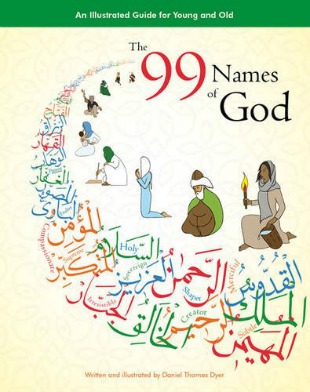Daniel Thomas Dyer is an author, illustrator, and co-founder of the children's multifaith publisher Chickpea Press. A great lover of poetry, he was called to Islam after falling in love with the beautiful poems of Mevlana Jalaluddin Rumi. He is now a student of the Mevlevi path (based on the teachings of Rumi and a member of the Threshold Society, which is co-directed by Kabir and Camille Helminski. He lives with his wife Saimma in the Lake District in the United Kingdom, where he draws inspiration from the mountains, lakes, rivers, and trees. Dyer and Camille Helminski created the S&P e-course The Ninety-Nine Names of God.
This beautifully illustrated book, we can honestly say, is for people of all ages. Now elders, we found it so accessible that we began to read it daily to remind ourselves of the many qualities of the Divine. Although we haven't tested it with children, we are sure they will be drawn to the clear explanations, colorful symbolic illustrations, and captivating quotes and stories. It's a great book for discussions in families and with extended circles of friends. As Camille Helminski writes in the foreword, "It presents a well-balanced view of Islam through the Names of God as expressed through the Holy Quran and opened in meaning through accompanying words of the saints."
The 99 Names are presented in the traditional order, but in a "How to Use This Book" section Dyer has also provided other themes through which you can engage with them: The Heart of Islam, The Five Pillars, Spiritual Practices of Islam, Virtues of Islam, The Wider World and Islam, The Seen and the Unseen, and Trials and Difficulties in Islam.
The pages devoted to each name include:
- The Name in Arabic
- A definition of the Name in English
- Signs of the Name's presence
- A quote from the Holy Quran that includes the Name
- A quote from a saint referencing the quality of the Name
- Reflections and Activities
We especially appreciate the simple definitions of each Name and the sections on signs. They explain with illustrations that children can easily understand how to recognize each Name's presence in daily life. For example, here is the definition of al-Latif:
"Al-Latif means the Subtle. If something is subtle it is very refined, gentle, pleasing, and mysterious. The beauty, love, and intelligence of Allah is like this: it can be impossible to describe, but moves us in a very deep way."
And here are Signs of al-Latif:
"The Prophet Muhammad appreciated subtlety. He said that the three things he loved most in the world were women, perfume, and prayer.
"Muhammad was a true gentleman: no man treated women with more respect. He also loved perfume, and smell is often said to be our most subtle sense. We can't see a scent and they can be difficult to describe, but they enter into our very bodies and affect us in a subtle way. Prayer is also very subtle. We cannot see God, but during prayer we might sense God's mysterious presence like a fragrance on the breeze. The gifts that God gives us are often subtle too – we might not realize we have them."
Many of the signs come from nature. Owls, which have amazing hearing and sight, remind us of As-Sami (the All-Hearing) and Al-Basir (the All-Seeing). The waves in the ocean are like complex patterns evolving (al-Bari), whereas the water cycle (evaporation producing clouds which produce rain) remind us of al-Musawwir (the Shaper). The blue whale, longer than three double-decker buses, might remind us of Al-Kabir (the Greatest) but the whale is small compared to the ocean and our galaxy, and God is greater than all that.
There are short poems, stories, or quotes associated with each name from the Friends of God – Abraham, David, Mary, Jesus, Khadijah, Rabiah, Al-Ghazali, Shams, Rumi, and many others. Each has his/her own representative illustration, and brief bios are included in the back of the book.
The activities section offers many questions for discussion. For example, for Al-Wakil (the Trustee), you are encouraged to reflect upon whom you trust and why. Muhammad is quoted as saying, "Put all your cares into one care and God will look after all your cares," followed by the suggestion that you "Consult with friends and family whose wisdom you trust – what do you think this means?" You can continue then by seeking the meaning of the hadith "Trust in God but tie your camel."
We predict that you will find this exploration of the 99 Names to be heart-opening. It encourages you to reflect upon the meaning of the Names and seek ways to discover and manifest them in your life. We can also say that this book is for people of any faith and no faith. As Dyer explains, "No answers are contained in this book. The important thing is that we learn to ask questions, reflect, research, and discuss with others to arrive at our own considered point of view."
May your exploration of the Divine Names be blessed.
